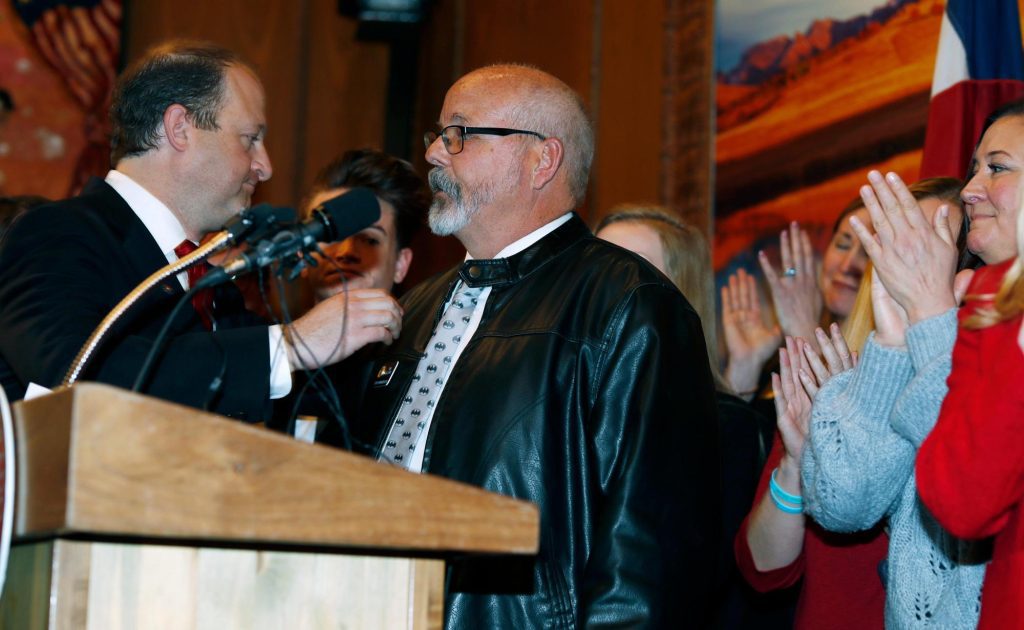By JESSE BEDAYN (Associated Press/Report for America)
DENVER (AP) — A bill to ban the sale and transfer of semi-automatic firearms was nixed in Colorado’s Democratic-controlled Legislature on Tuesday as lawmakers pressed forward with a slew of other gun control bills on the 25th anniversary year of the Columbine High School massacre.
The western state has a deep history with firearms that is pockmarked by some of the most high-profile mass shootings nationwide. Both factors loom large over gun control debates in the Legislature, complicating attempts at such bans that nine other Democratic-controlled states have in place, including California and New York.
The Colorado House passed the ban in a historic first and what proponents see as a “tremendous achievement” after roughly the same proposal was swiftly nixed last year. But some Senate Democrats are wary of the efficacy and breadth of the ban, which prohibits the sale, transfer and manufacture of semi-automatic firearms.
Colorado's shift in political affiliation is indicated in part by a number of successful gun control measures passed last year, including raising the buying age for a gun from 18 to 21. Some half-dozen proposals are nearing passage this year, including a bill to put a measure on the November 2024 ballot to tax sales of guns and ammunition. Another would give the Colorado Bureau of Investigation more power to investigate gun sales that are already illegal.
Efforts to implement a broader ban have been hindered by the state's mixed political leaning.
A decade ago, two lawmakers were ousted in the state’s first recall elections over their support for bills that set limits on ammunition magazines and expanded background checks.
“That history, I think, lingers,” said Democratic state Sen. Julie Gonzales, one of the semi-automatic ban bill’s sponsors. She added that the proposal’s success in the House “signals that there is a new space for us to have different conversations.”
But for now, at a sparsely attended committee hearing Tuesday, Gonzales asked that the legislation be put to rest in the face of opposition from Senate Democrats.
On that committee sits Democratic state Sen. Tom Sullivan, who would have been a “no” vote, along with Republican lawmakers who have decried the bill as an encroachment on Second Amendment rights.
Sullivan’s son, Alex, was one of 12 killed in the 2012 Aurora theater shooting at a midnight screening of “The Dark Knight Rises.” The tragedy propelled Sullivan into activism around gun control and then public office, where he has spearheaded many bills on the issue.
Sullivan said the weapons that the bill seeks to curtail are involved in only a small fraction of gun deaths and injuries. Those firearms include a long list of semi-automatic rifles, along with some pistols and shotguns, with certain characteristics, such as a threaded barrel or detachable stock.
Their prohibition wouldn’t make much of a dent in gun violence, Sullivan argued, and the proposal takes up immense political oxygen in the state capitol — energizing the opposition and detracting from more effective and less controversial gun control measures.
“The story is completely incorrect,” Sullivan stated. “That’s what they want you to think, that it’s assault weapons and schools. It’s not. … It’s suicides and it’s domestic violence.”
Democratic state Rep. Tim Hernández, one of the bill’s sponsors, said he’d had many conversations with Sullivan in the months before.
“We both agree that an assault weapons ban is not a perfect solution to the problem of gun violence,” Hernández said. “For us to get to a point where we are examining all the ways that gun violence appears, we have to create policies for all the ways it shows itself.”
The plan is expected to be brought back next year.
In the meantime, other bills approaching the governor’s desk include a proposition to mandate more thorough safety training for someone applying for a concealed carry permit. And one would mandate firearm dealers to acquire a state permit, not just a federal one, to give regulators more authority to enforce state gun laws.









